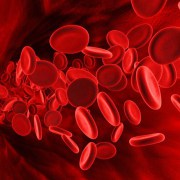Symptoms
This condition produces a group of symptoms known as a sickle cell crisis. These are episodes of pain that occur with varying frequency and severity. It is usually followed by periods of remission. The risk for a sickle cell crisis increases with any activity that boosts the body's requirement for oxygen. This may include illness, physical stress, or high altitudes.
These painful crises can last hours to days. They affect the bones of the back, the long bones, and the chest. The crises can be severe enough to require hospital admission for pain control and IV fluids.
Symptoms of impending sickle cell crisis include:
- Pain and swelling in the hands and feet
- Fever
- Jaundice
- Anemia
- Chest pain, or episodic pain in joints, abdomen, or back
- Shortness of breath
- Fatigue
- Abdominal swelling
- Unusual or prolonged headache
- Any sudden weakness or loss of sensation
- Priapism (prolonged erection)
- Sudden vision changes
-
Sudden, severe anemia can cause:
- Weakness
- Shortness of breath
- Heart failure
- Shock
- Loss of consciousness
Complications of sickle cell anemia include:
- Destruction of the spleen
-
Severe bacterial infections:
- Pneumonia
- Meningitis
- Kidney and bone infections
- Damage to the joints (especially hip and shoulder)
- Gallstones
- Damage to eyes, resulting in impaired vision
- Stroke or other neurological impairment
- Seizures
- Liver disease
- High rate of hepatitis C
- Damage to penis, due to priapism (may result in impotence )
- Leg ulcers
- Heart murmurs or enlarged heart
- Delayed growth
- Delayed sexual development
Diagnosis
Hemoglobin electrophoresis is a simple blood test. It can be done by a doctor or local sickle cell foundation. Most states require testing of newborns for sickle cell.
Amniocentesis is a form of prenatal testing. It can also detect sickle cell disease.
Please be aware that this information is provided to supplement the care provided by your physician. It is neither intended nor implied to be a substitute for professional medical advice. CALL YOUR HEALTHCARE PROVIDER IMMEDIATELY IF YOU THINK YOU MAY HAVE A MEDICAL EMERGENCY. Always seek the advice of your physician or other qualified health provider prior to starting any new treatment or with any questions you may have regarding a medical condition. Copyright © 2024 EBSCO Publishing All rights reserved.
 What is Sickle Cell Anemia?
What is Sickle Cell Anemia?
